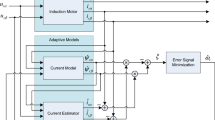Abstract
In this paper, the sensorless torque robust tracking problem of the induction motor for hybrid electric vehicle (HEV) applications is addressed. Because motor parameter variations in HEV applications are larger than in industrial drive system, the conventional field-oriented control (FOC) provides poor performance. Therefore, a new robust PI-based extension of the FOC controller and a speed-flux observer based on sliding mode and Lyapunov theory are developed in order to improve the overall performance. Simulation results show that the proposed sensorless torque control scheme is robust with respect to motor parameter variations and loading disturbances. In addition, the operating flux of the motor is chosen optimally to minimize the consumption of electric energy, which results in a significant reduction in energy losses shown by simulations.
Similar content being viewed by others
References
A. B. Proca, A. Keyhani. Induction Motor Control for Hybrid Electric Vehicle Applications[R]. Columbus, Ohio: the Ohio State University, 2001.
A. B. Proca, A. Keyhani. Identification of variable frequency induction motor models from operating data[J]. IEEE Transactions on Energy Conversion, 2002, 17(1): 24–31.
G. R. Slemon. Modeling of induction machines for electric drives[J]. IEEE Transactions on Industry Applications, 1989, 25(6): 1126–1131.
Amuliu Bogdan Proca, A. Keyhani, J.M. Miller. Sensorless slidingmode control of induction motors using operating condition dependent models [J]. IEEE Transactions on Energy Conversion, 2003, 18(2): 205–213.
P. Vas. Vector Control of AC Machine[M]. Oxford: Clarendon Press, 1990.
S. Drakunov, V. Utkin. Sliding mode observers. Tutorial[C]// Proceedings of the 34th IEEE Conference on Decision & Control. New York: IEEE Press, 1995: 3376–3378.
S. Drakunov. Sliding mode observers based on equivalent control method[C]//Proceedings of the 31th IEEE Conference on Decision & Control. New York: IEEE Press, 1992: 2368–2369.
V. Utkin, J. Guldner, J. Shi. Sliding Mode Control in Electromechanical Systems[M]. Philadelphia: Taylor & Francis, 1999.
C. Matsuse, T. Yoshizumi, S. Katsuta, et al. High response flux control of direct-field-oriented induction motor with high efficiency taking core loss into account[J]. IEEE Transactions on Industry Applications, 1999, 35(1): 62–69.
J. K. Seok, S. K. Sul. Optimal flux selection of an induction machine for maximum torque operation in flux-weakening region[J]. IEEE Transactions on Power Electronics, 1999, 14(4): 700–708.
Author information
Authors and Affiliations
Additional information
This work was supported in part by State Science and Technology Pursuing Project of China (No. 2001BA204B01).
Yan LIU is a professor of School of Information Engineering of Dalian University. She is completing the requirements for the Doctor of Industry Science degree in Control Theory and Applications in Dalian University of Technology, Dalian. Her research interests include control and modeling, parameter estimation, failure detection of electric machines, and faulttolerant control for induction motor drives in automotive applications.
Cheng SHAO is a professor of Research Institute of Advanced Control Technology, Dalian University of Technology. His research interests include robust adaptive control, intelligent learning control, and optimizing control for industrial processes.
Rights and permissions
About this article
Cite this article
Liu, Y., Shao, C. Sensorless torque control scheme of induction motor for hybrid electric vehicle. J. Control Theory Appl. 5, 42–46 (2007). https://doi.org/10.1007/s11768-006-6001-7
Received:
Revised:
Issue Date:
DOI: https://doi.org/10.1007/s11768-006-6001-7




